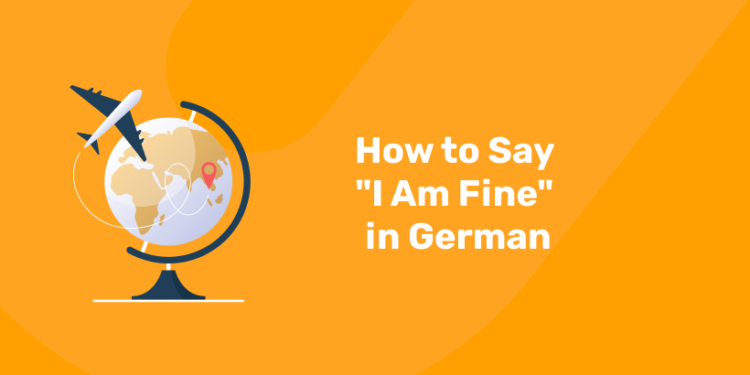Table of Contents
German is one of the most spoken languages in Europe and is known for being precise and expressive. When learning German it’s important to know the common phrases and greetings that are the foundation of everyday conversations. One of the most basic but most used phrases you’ll be using is “I am fine”. This phrase not only says how you are but also sets the tone for a polite conversation. In this blog post we’ll look at different ways to say “I am fine” in German, plus other greetings, formal alternatives and practical tips to master these phrases.
Whether you’re traveling to Germany, talking to German speaking friends or just expanding your language skills, knowing how to say how you are is key. “How to say I am fine in German” is a phrase you’ll use in many situations, from casual to formal. This blog will show you different ways to say “I am fine”, introduce you to common German greetings and give you tips on how to practice these phrases.
Learn German language in your own language! Get free Demo Classes Here!
How Do You Say Hello in German?
Before we get to how to say “I am fine” let’s start with how to start a conversation in German. The most common way to say “hello” in German is “Hallo”. This is a general greeting that can be used in almost any situation, whether you meet someone for the first time or a friend.
However, Germans often use different greetings depending on the time of day:
- Guten Morgen (Good morning): Used in the morning until around noon.
- Guten Tag (Good day): A more formal greeting used from midday until the early evening.
- Guten Abend (Good evening): Used in the evening.
- Grüß Gott (God greet you): A traditional greeting in Southern Germany and Austria, equivalent to “Hello” or “Good day.”
Now you’ve greeted someone, the next question is “Wie geht’s?” (How are you?). That’s where knowing how to say “I am fine” in German.
How to say “I am fine” in German
1: How do you say "Good Morning" in German?
The phrase “I am fine” in German can be said in several ways depending on the situation and your level of formality. Here are the most common translations:
- Ich bin gut.
- I am good.
- Use: This is a straight forward way to say “I am fine.” Use with friends or peers.
- Mir geht es gut.
- I am fine/I am doing well.
- Use: This is more common in everyday language and a bit more formal than “Ich bin gut.” It’s a general response that works most of the time.
- Es geht mir gut.
- I am fine/I am doing well.
- Use: Same as “Mir geht es gut” this can be used to say you’re doing well.
- Alles in Ordnung.
- Everything is in order/Everything is fine.
- Use: When you want to say everything is fine without focusing on yourself.
Formal Alternatives to “I Am Fine” in German
In more formal situations like business meetings, interviews or when speaking to someone older or of higher status you should use polite and formal expressions. Here are the formal alternatives to say “I am fine” in German:
- Mir geht es sehr gut, danke.
- I am very well, thank you.
- Use: When asked about your well-being in formal situations.
- Es geht mir ausgezeichnet.
- I am doing excellently.
- Use: When you want to express you’re doing exceptionally well in a formal context.
- Ich danke Ihnen, mir geht es gut.
- Thank you, I am fine.
- Use: Formal and polite, shows gratitude and you’re well.
- Mir geht es bestens.
- I am doing great.
- Use: When you want to say you’re in excellent condition, works in formal and informal situations.
Learn German language in your own language! Get free Demo Classes Here!
German Greetings Practice: Tips and Exercises
Learning how to say “I am fine” in German and other greetings is just the beginning. To really master these phrases you need to practice consistently. Here are some tips and exercises to help you practice and improve your German greetings:
- Language Exchange Partners:
- Find a language exchange partner who speaks German fluently. Regular conversations with a native speaker will help you practice greetings and other essential phrases in real life.
- Flashcards:
- Create flashcards with different German greetings and their English translations. Practice them daily to commit them to memory.
- Role-Playing:
- Do role-playing exercises where you simulate different scenarios, like meeting someone for the first time, a business meeting or a casual chat with a friend. This will help you practice the right greetings and responses for each situation.
- German Media:
- Listen to German podcasts, watch German TV shows or follow German YouTube channels. Pay attention to how native speakers greet each other and answer questions about their well-being.
- Entri’s German Language Course:
- For structured learning enroll in Entri’s German Language Training Course. This course covers German greetings, conversational phrases and more to help you build a solid foundation in the language.
Conclusion
Saying “I am fine” in German is part of learning the language. Whether you use casual phrases with friends or formal ones in a professional setting, being able to express yourself confidently is key. By knowing different ways to say “I am fine”, practicing regularly and immersing yourself in German language resources you will be on your way to fluency.
And if you want to learn German or improve your language skills, enroll in Entri’s German Language Course. This course provides a structured learning of German from basic greetings to advanced conversational skills so you are ready for any situation.
Saying greetings and “I am fine” is just the start. With persistence, practice and the right tools you will be talking and connecting with Germans in no time.
| German Language Courses | |
| German Language A1 Course Online Coaching | German Language A2 Course |
| German Language B1 Course online Coaching | German Language B2 Course Online Coaching |
Frequently Asked Questions
How do you say "I am fine" in German?
The most common way to say “I am fine” in German is “Mir geht es gut,” which translates to “I am fine” or “I am doing well.” Other alternatives include “Ich bin gut” and “Es geht mir gut.”
What is the formal way to say "I am fine" in German?
In formal situations, you can say “Mir geht es sehr gut, danke,” meaning “I am very well, thank you,” or “Es geht mir ausgezeichnet,” which translates to “I am doing excellently.”
How do you greet someone in German?
Common German greetings include “Hallo” (Hello), “Guten Morgen” (Good morning), “Guten Tag” (Good day), and “Guten Abend” (Good evening). The choice depends on the time of day and the level of formality.
What are some tips for practicing German greetings?
Practice with a language exchange partner, use flashcards, engage in role-playing exercises, listen to German media, and consider enrolling in Entri’s German Language Course for structured learning.
Can I learn German greetings and phrases through an online course?
Yes, Entri’s German Language Course offers comprehensive lessons on German greetings, conversational phrases, and more, helping you build a strong foundation in the language.











